The beloved science fiction stories from Isaac Asimov’s books are slowly becoming a reality. We will not see a robot uprising anytime soon. However, we should expect a revolution of AI-powered tools that will improve all market sectors, from analytics to digital shopping to web design. AI tools are good options to elevate web designers’ work to a new level.
Speaking of the web design sphere, we already have some AI tools, plugins, software, and third-party solutions that streamline workflows. However, with ChatGPT, a generative pre-trained transformer or intelligent chatbot that fulfills tasks according to instructions shared in a conversation, some processes will become even more effortless and manageable. It will undoubtedly improve the work of web designers and open the doors for those who do not have massive experience to complete some unique tasks.
Check out our curated collection of ChatGPT prompts that already simplify work by providing guidelines, specifications, and hints on how to meet current standards in the projects and even take them to the next level.
Let’s consider some other benefits of AI tools for web designers, check out their shortcomings and limitations, and examine 10 of the best solutions in this niche that already help creatives make the web a better place with outstanding, high-end, and inspiring web designs done with AI assistance.
Benefits of Using AI-Powered Platforms and Solutions
AI has become an over-hyped buzzword for a good reason. This is a new stage of the evolution of the digital world. Applied to every sector in the market, it enables new possibilities and efficiencies and allows people to undertake their responsibilities and capabilities at specific tasks inexpensively and at scale.
How does it affect web design? Even now, at its dawn, it brings numerous improvements that many companies recognize. Consider recent studies that show that almost 67{4224f0a76978c4d6828175c7edfc499fc862aa95a2f708cd5006c57745b2aaca} of businesses that do not use web design to communicate better with their audience said they would do so if it were more accessible, easier, and faster. This makes AI-powered tools crucial for these companies to set foot in web design to make their communication and ipso facto relationships with customers more intuitive and productive.
Online Email Template Builder
With Postcards you can create and edit email templates online without any coding skills! Includes more than 100 components to help you create custom emails templates faster than ever before.
Try FreeOther Products
There is more. AI-powered tools bring to the web design sector many other advantages, such as:
- They reduce manual work.
- They ease up the workload by automatically refining projects.
- They eliminate repetitive tasks like removing backgrounds and creating mockups.
- They generate multiple versions of the same part of the UI mockups, like a slider or testimonial widget, based on the designer’s preferences, needs, and previous designs.
- They automate menial chores, thereby minimizing so-called mood-killing tasks, allowing web designers to focus on being more creative.
- They deliver faster and sometimes more accurate user-requested content by analyzing the target audience’s profile and suggesting designs based on that data.
- They offer solutions for hyper-personalized experiences by identifying best-converting designs and user preferences and analyzing usability metrics.
- They create unique and alternate versions of visual assets based on brand identity specifications without compromising the brand’s integrity.
- They generate design ideas boosting those with a lack of inspiration.
On top of that, AI brings numerous benefits to the field in general. For instance,
- It reduces errors that humans are prone to make.
- It increases accuracy and precision.
- It minifies risks in many processes.
- It handles tedious, repetitive jobs that give humans more time to exercise creativity and develop unique solutions, designs, and graphical assets.
- It solves problems 24/7 providing answers to questions any time of the day.
- It ensures a more accurate decision-making process because of the absence of any biased views and taking into account a bulk of information with its complex algorithms in a short time.
- It leads to an immense increase in productivity and the amount of content produced.
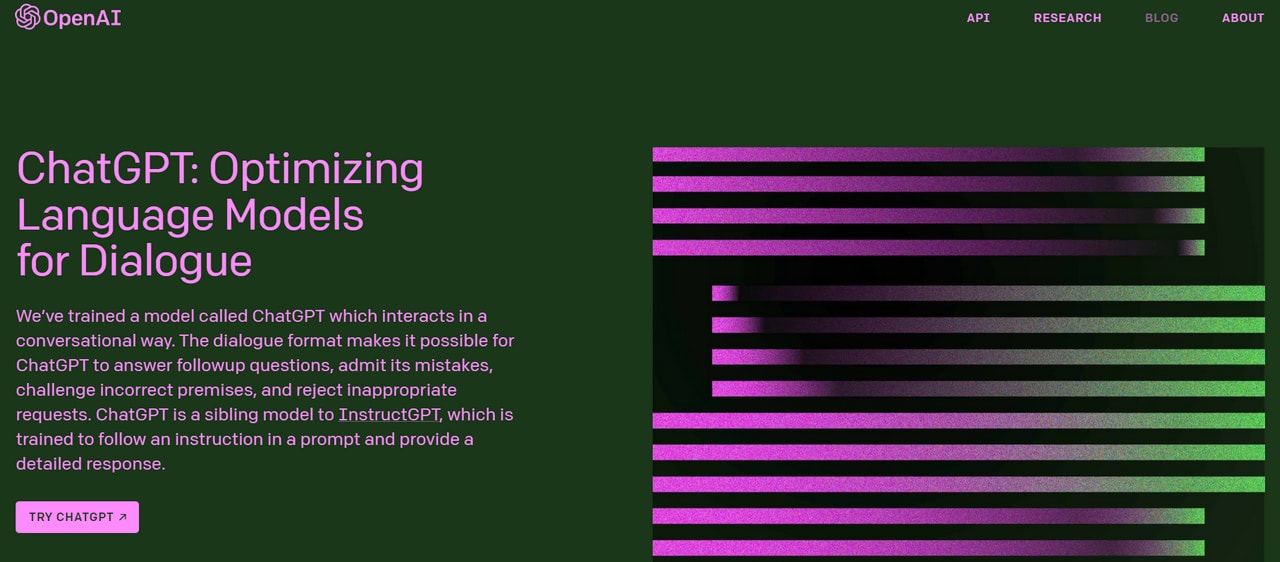
Shortcomings of AI-Powered Solutions
Although the revolution has already started, current AI-powered technologies are far from being called perfect. They have shortcomings and disadvantages. Some AI solutions are costly because the more sophisticated they are, the more resources they require. They already need to operate on the latest hardware and software. This also causes significant environmental damage due to intensive energy use.
Another huge problem lies in security problems due to data leakage and possible violations of copyright.
Other widespread flaws of AI-powered solutions for web designers are the following:
- Failures and distortion in AI image enhancements and manipulations.
- No thinking outside the box because AI solutions are based on pre-fed data and past experiences.
- No unique human touch.
- Lack of visibility and transparency.
What Can Web Designers Do with AI-Powered Technologies?
Despite shortcomings, AI solutions have advantages that already outweigh their disadvantages. They improve the lives of web designers by streamlining their workflows and giving them time to be more creative and productive. Even though this niche is still evolving and certainly on probation, however, web and graphic designers already enjoy these benefits:
- Easier image and dummy text generation.
- More sophisticated and impressive image enhancement.
- Photo manipulations automatically and quickly.
- Quicker and less painful background removal that keeps web designers away from hours of scrupulous work.
- Creating unique virtual influencers without much trouble. Some AI tools can generate a custom hyper-realistic photo of a human that has never existed before.
- Taking pictures to the next level by adding AI-generated movement.
- Transforming doodles into professionally looking illustrations.
- Getting case studies and UX briefs to make informed design decisions.
- Getting design flows.
- Synthesizing research results to derive the most crucial points in no time.
- Decreasing the overall costs.
- Repurposing content across multiple channels and sharing it on the go.
- Generating content perfectly suitable for web designs.
- More efficient and fast desktop and mobile optimization.
Features of Good AI Web Design Tools
The task of AI tools is to streamline workflows; therefore, they should have certain features. This includes the following:
- Intuitive interface with a little or no learning curve. Alternatively, it can be an interface made as a communication device such as chat.
- Easy navigation.
- Tools for ideation and conceptualization.
- Mobile-friendliness.
Last but not least, premium plans and support team. These features indicate that the solution is under constant control; therefore, it is regularly revisited and updated to become flawless.
It is hard to find an AI platform that meets all these criteria. However, we have compiled a collection of the best AI tools for web designers in 2023 that have most of these aspects.
Best AI Tools for Web Designers
Although there are no chatbots that will generate flawless web design templates based on instructions within seconds, at least for now, however, there are already AI-powered tools that can do a part of this job successfully. Plus, some may dramatically improve workflow, make the life of web designers much easier, and give a boost and, most importantly, extra time to create something incredible and worthy.
We are going to start with some small yet crucial AI-based instruments that simplify web designers’ lives by automating mundane tasks quickly and efficiently and solving some unique problems creatively.
Colormind and Khroma
Both of these AI-powered instruments were created to undertake one of the most mundane, repetitive, yet increasingly crucial tasks in web design flow – creating harmonious color palettes.
Those aware of Color Psychology know that color can easily make or break a project. It plays a significant role in web design success, leading to high conversions and better brand recognition. Developing a color scheme that meets the client’s criteria is imperative. It is an arduous process: designers spend hours finding the proper combination.
However, with the invention of color palette generators like Colormind or Khroma, this stage in web designing has become less painful, easier, and quicker. Both these instruments have presented creatives with incredible capabilities. Let’s consider each one closely.
Colormind has been around for several years; therefore, it has been thoroughly tested and approved by the community. It learns color styles from photographs, movies, and popular art that have been uploaded every single day. It already has a vast database of color palettes generated by others.
- You may use it to find inspiration.
- You may upload a photo and derive natural color combinations from it.
- You may explore web color palettes by introducing them in automatically generated web pages to see whether they work for the brand.
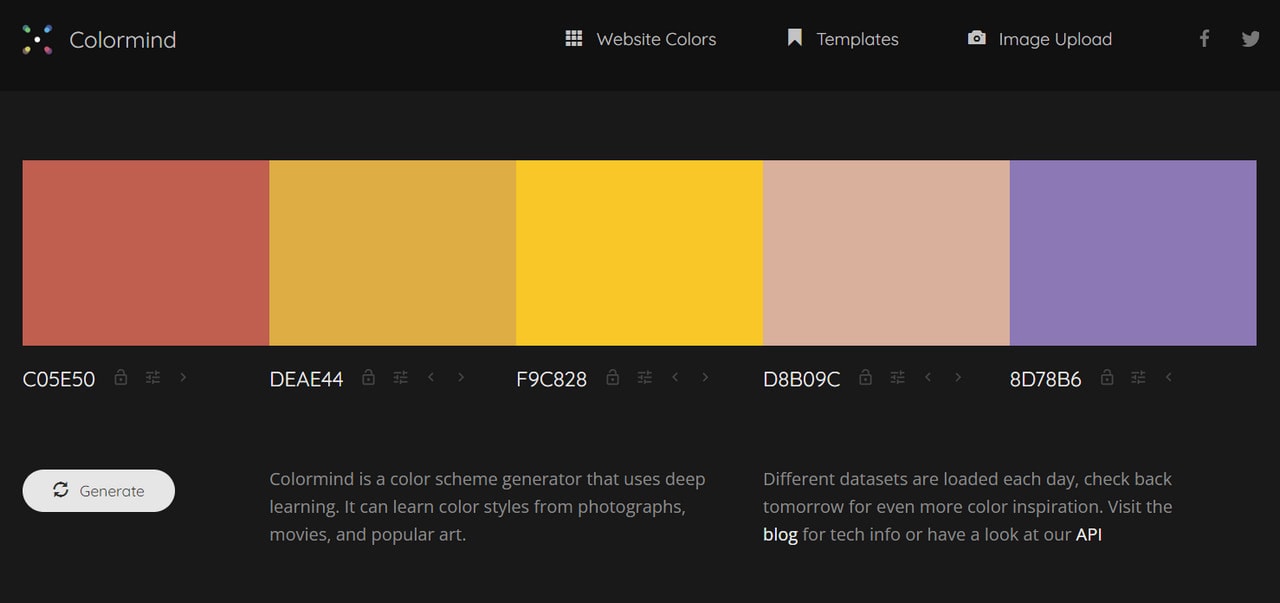
Khroma is an AI-based color tool you can train by choosing 50 colors you like. The machine generates an endless combination of color palettes based on these preferences. They can be shown on templates that cover popular use-case scenarios—for instance, Type, Poster, Gradient, and Image. On top of that, users can test color schemes on their custom images.
Both these tools save a bulk of time and dramatically shorten this stage of web design.
Vance AI
AI image processing and automatic photo editing instruments are the tools that have made the lives of web designers and everyone else who requires polished or manipulated photos much easier. Vance AI is one of the most famous representatives in this sub-niche.
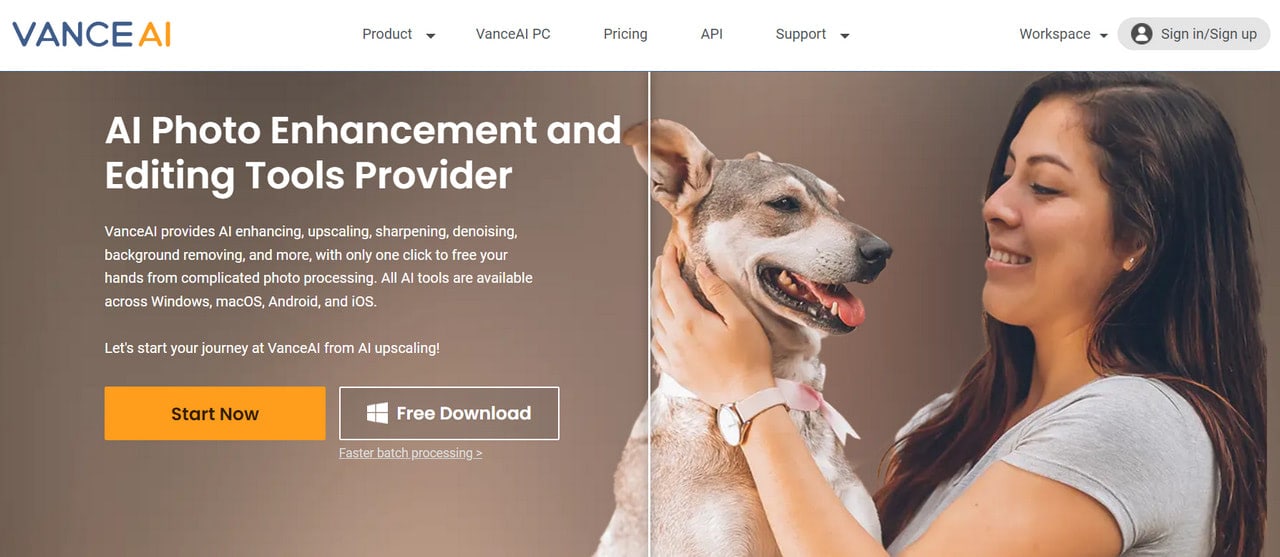
This great AI assistant provides web designers with these capabilities:
- Photo enhancer, upscale, denoiser, sharpener.
- Background remover.
- Portrait retoucher and colorizer.
- Photo dehazer.
- Photo restorer.
- Art generator from the text.
- Imitation of artistic styles.
- Cartoon maker.
- Turning a photo into a line drawing.
Vance AI excels at handling real details because it uses Deep Convolutional Neural Networks that are trained on millions of images.
Use the platform to simplify workflow and open new possibilities for creative photo manipulations and edits that meet the brand’s guidelines and client’s expectations.
Stable Diffusion
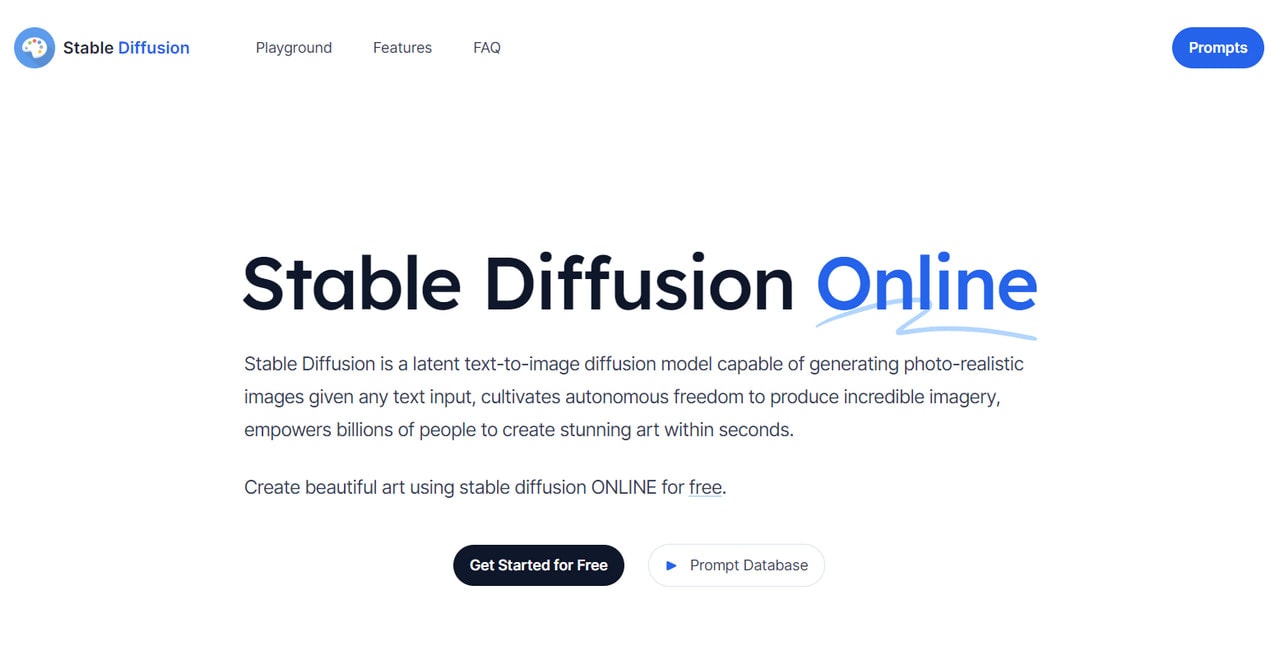
Being a collaboration of Stability AI, CompVis LMU, and Runway with support from EleutherAI and LAION, Stable Diffusion is a relatively new AI-based tool in the market that promises to bring some incredible results.
Now, it generates detailed images based on a text prompt that describes elements to be included or omitted from the output. On top of that, the model can re-draw existing images to incorporate new elements described by the user.
Stable Diffusion can also be applied to other tasks, such as outputting a new image based on the original image that features elements provided within the text prompt or generating image-to-image translations.
The best part is it is free. You may try it right now. However, consider copyright and responsible usage of outputs.
Dall-E
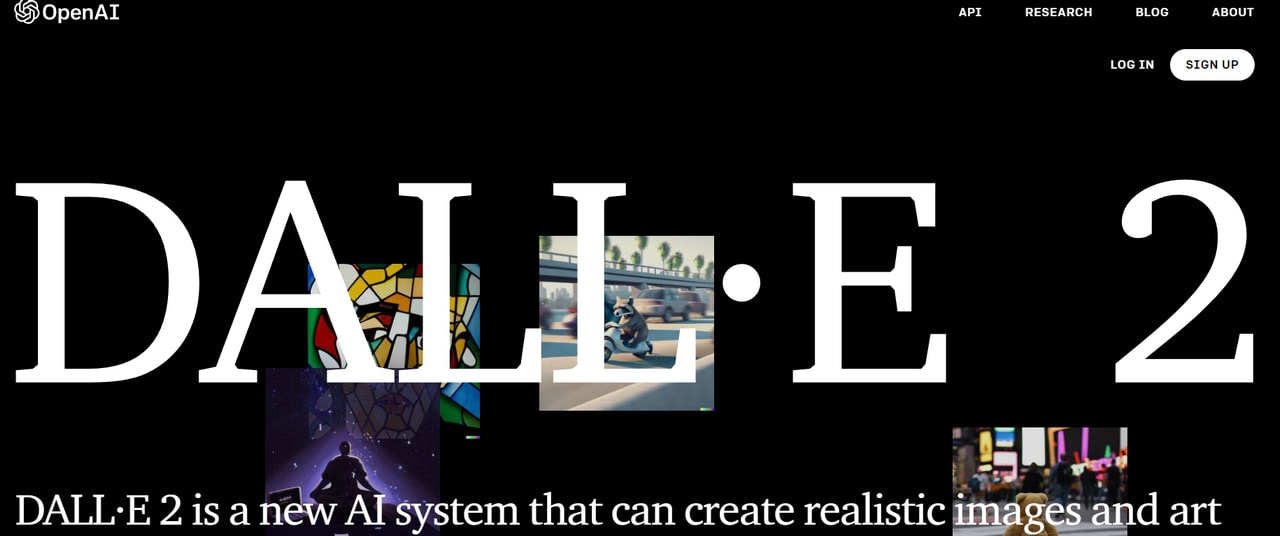
When speaking about deep learning models used to generate digital images from natural language descriptions, we could not help but mention Dall-E. Although this potent AI tool has some legal issues due to a lack of clarity around image ownership, it has already revolutionized how we can create pictures in certain styles.
So, what is it all about? Dall-E is an AI machine that generates images based on prompts. It can create realistic pictures at higher resolutions that reflect certain concepts, feature specified attributes, and even imitate preferred styles.
It does these tasks:
- It takes original images to the next level by expanding the canvas and creating new compositions.
- It modifies existing images by adding or removing elements while considering shadows, reflections, and textures.
- It creates different variations inspired by the original picture.
The good news is that Dall-E cannot generate violent, hateful, or adult images. It also uses advanced techniques to prevent photorealistic generations of real individuals’ faces. So public figures are safe and sound.
Web designers may safely use it to create personalized vector stocks for their web design concepts.
Midjourney
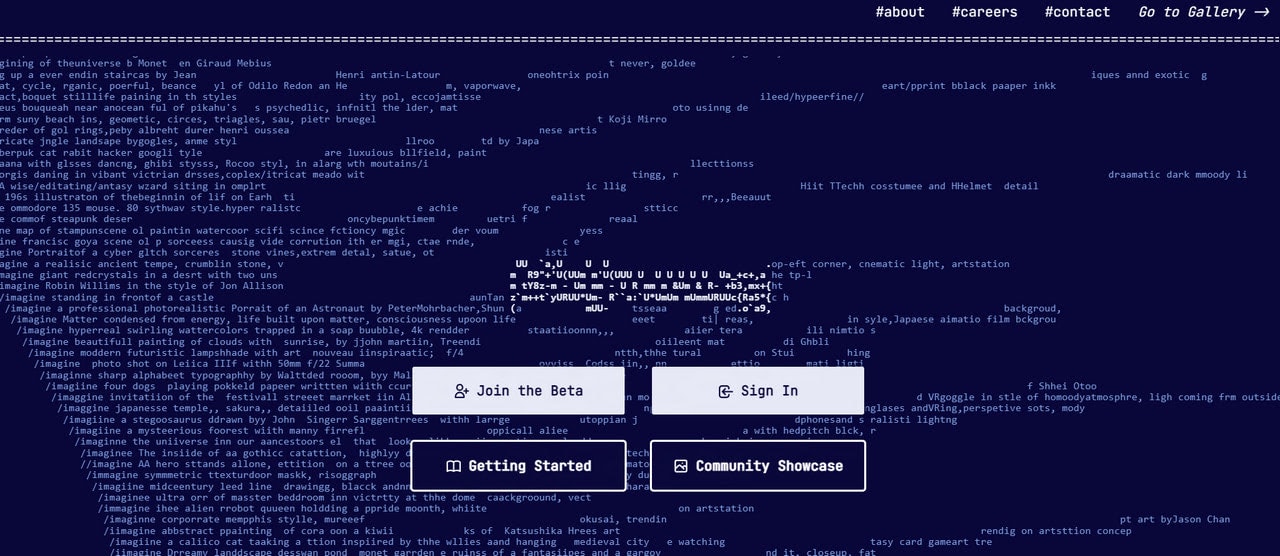
Midjourney has made a buzz recently. If you are a designer, I bet you have heard about it once or twice. Even though it is still on probation (the platform is available in an open beta version and collects feedback for improvements), the results are pretty promising.
Midjourney is a chatbot that communicates with users through a native language. Web designers may give it instructions and commands to create images, including web interfaces from textual descriptions and prompts. It is great for brainstorming and generating original content ideal for so-called “custom ads created for individuals.”
As the founder of Midjourney states, it was created for rapid prototyping to save artists a bulk of time and provide them with concepts based on their idea that they can show to their clients to ensure the best collaboration and output.
ChatGPT Prompts – Curated Collection
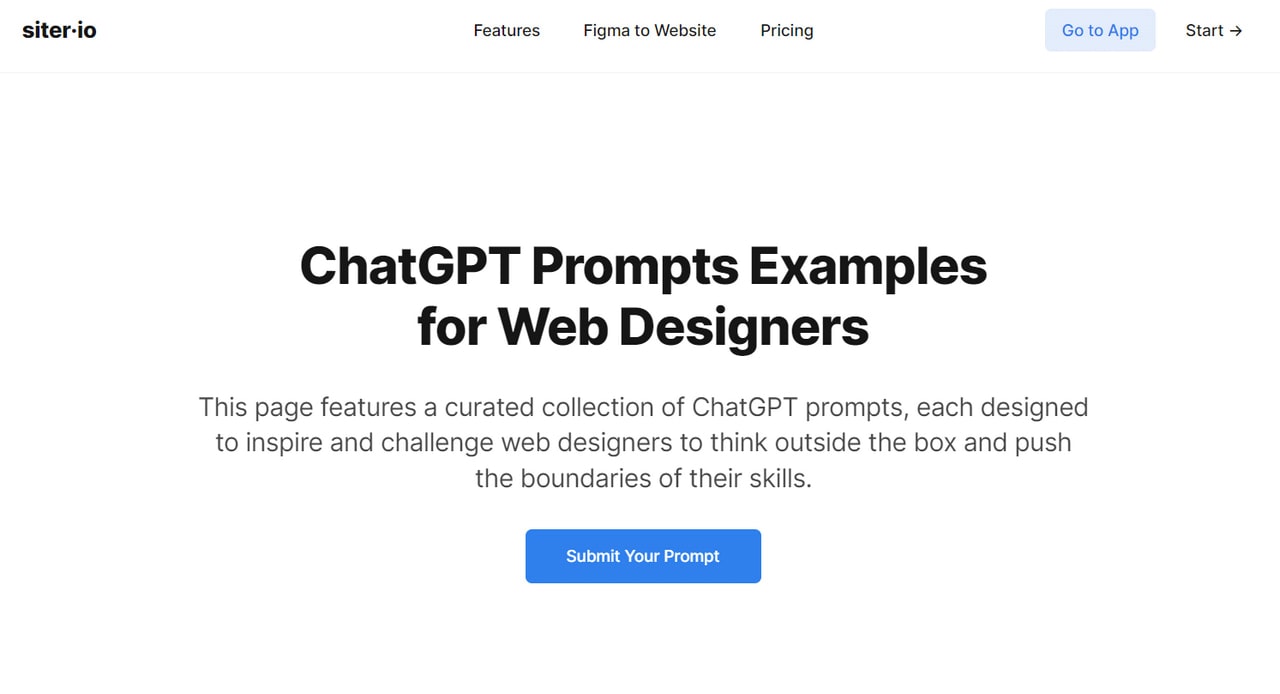
As mentioned earlier, ChatGPT has revolutionized the way to get web design tasks done. All it needs is a simple instruction. It takes an input sentence provided in the chat, processes it using algorithms, and generates an output that is relevant to the input.
Although, there is still plenty of room for improvement, it has already shown some great results. As proof, we have created a hand-picked collection of real ChatGPT prompts for web designers followed by outputs that handle some common issues. For instance, it features outputs from ChatGPT when it was asked to act as a web designer, UI/UX designer, copywriter, or project manager.
Therefore, if you need some quick solutions, check out samples featured in our list. On top of that, if ChatGPT has helped to solve your issue, please share it with us. Send us your prompt. We will add it to our collection to help fellow creatives to simplify their tasks and speed up the workflow.
Designs AI
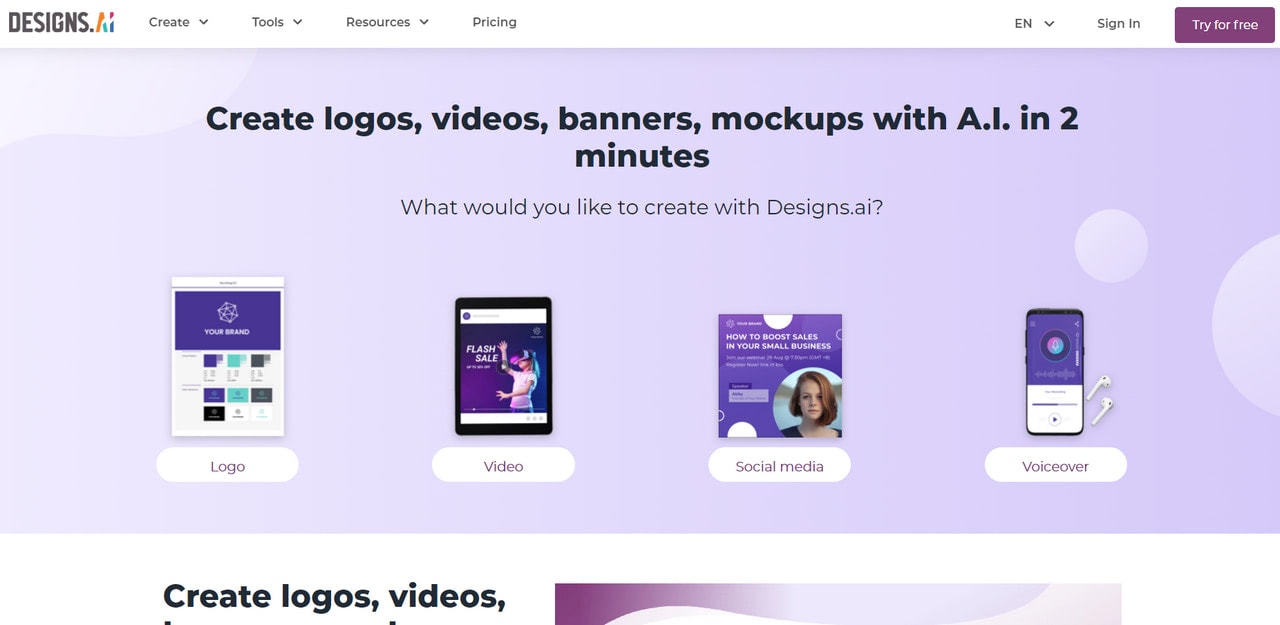
Designs AI is a powerful AI-based all-in-one solution for users without design skills and web designers who need to create beautiful templates within minutes. It can do a range of vital things for presenting the brand online and public, including:
- Logo
- Video
- Design
- and even Speech
It also has a graphic maker, color matcher, and font pairer.
It is a well-versed solution that provides generators and meets current standards and requirements. For instance:
- Logomaker presents users with style guidelines and brand narratives.
- Videomaker takes the content from articles, posts, and text scripts and transforms it into fully-edited videos in more than 20 languages.
- Speechmaker converts text scripts into voiceovers supporting multiple languages.
- Designmaker offers an intuitive playground with 20,000+ templates that can be edited within seconds.
Although it cannot generate a mockup on its own using your prompt, it still offers several excellent AI tools that streamline web designing workflow dramatically.
Zyro
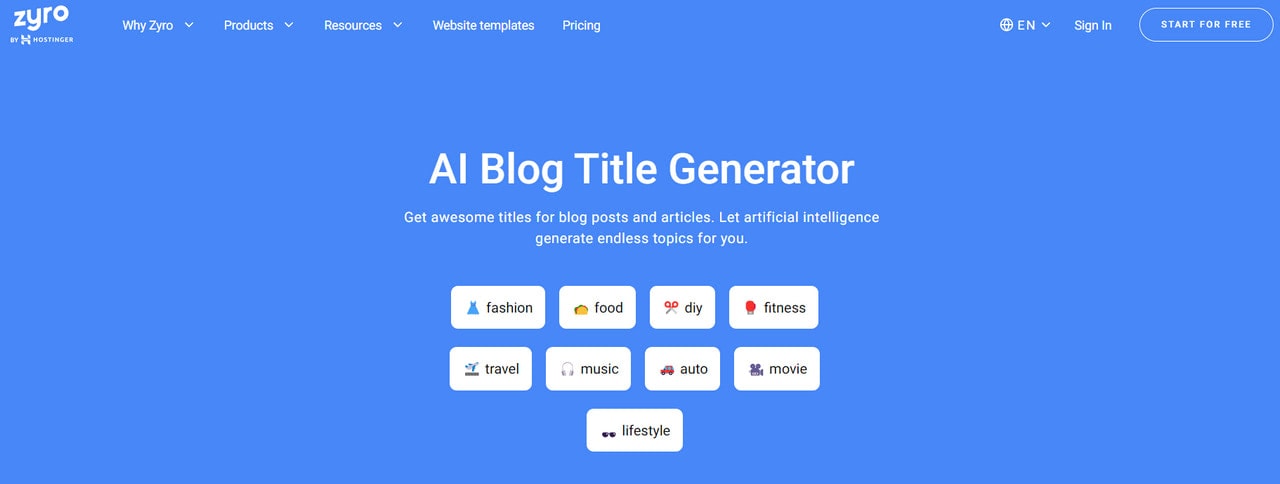
Gone are the days of Lorem Ipsum. Although this incredible online tool has saved millions of web designers from wasting time creating dummy text, the niche moves forward. Today, if you need a text snippet for your website, you may benefit from AI-powered instruments that generate human-like readable copies. And Zyro is one of them.
This AI-powered content machine generates a unique and personalized copy, including blog titles, within seconds, based on your settings. Trained on millions of resources, it follows the best online copywriting and SEO practices.
On top of that, it may come up with content for the Privacy Policy, Refund Policy, and Terms and Conditions pages that are crucial components of web projects in many niches, including SaaS, e-commerce, digital magazines, etc.
Uizard
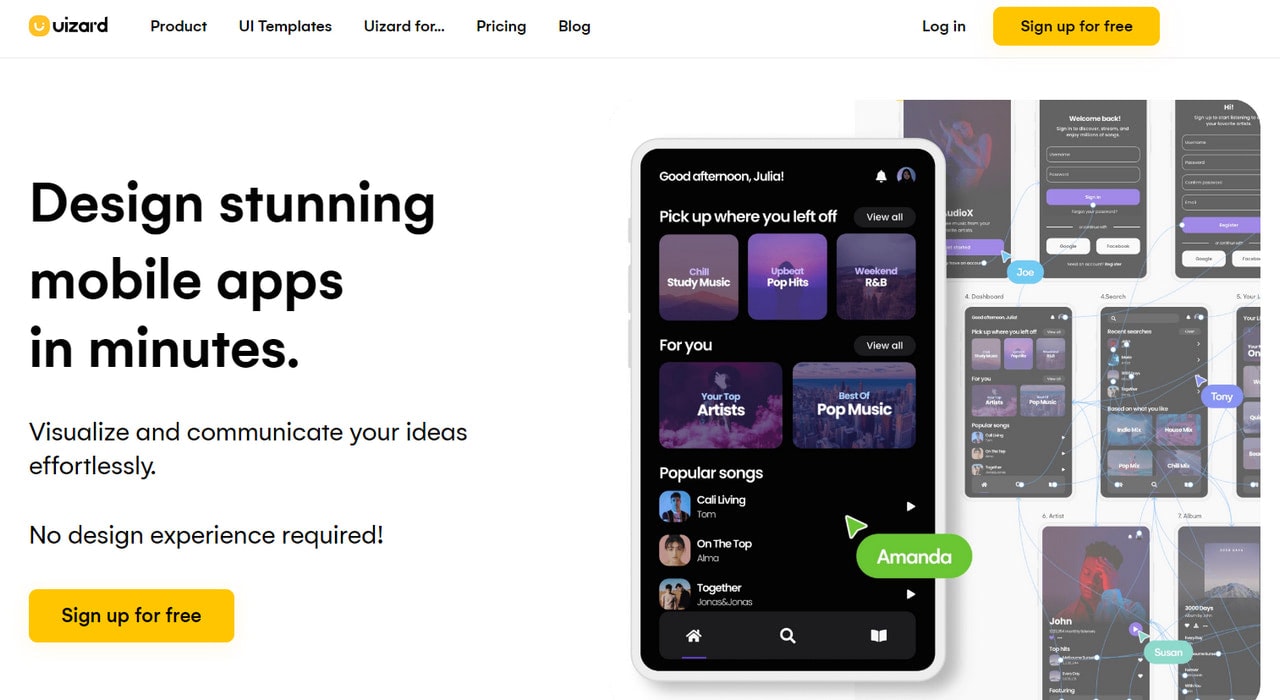
As the slogan of Uizard states, no design experience is required.
This exceptional AI-powered tool for web designers requires zero skills and experience in design to create websites with beautiful aesthetics, eye-pleasing features, and outstanding experience. With Uizard, clients can sketch their hand-drawn ideas and turn them into viable polished digitalized versions within minutes. It is the next generation of popular website builders with drag-and-drop playgrounds.
There is more. If you do not have a sketch, you may show the platform several screenshots of interfaces that you like. The AI assistant will automatically generate a unique UX design style and provide you with a solid foundation to move forward.
Uizard can create interfaces for mobile applications and websites, from small landing pages to massive e-commerce projects and web applications. It covers various scenarios applicable to product managers, UX designers, startup founders, consultants, and developers.
Sketch to Code
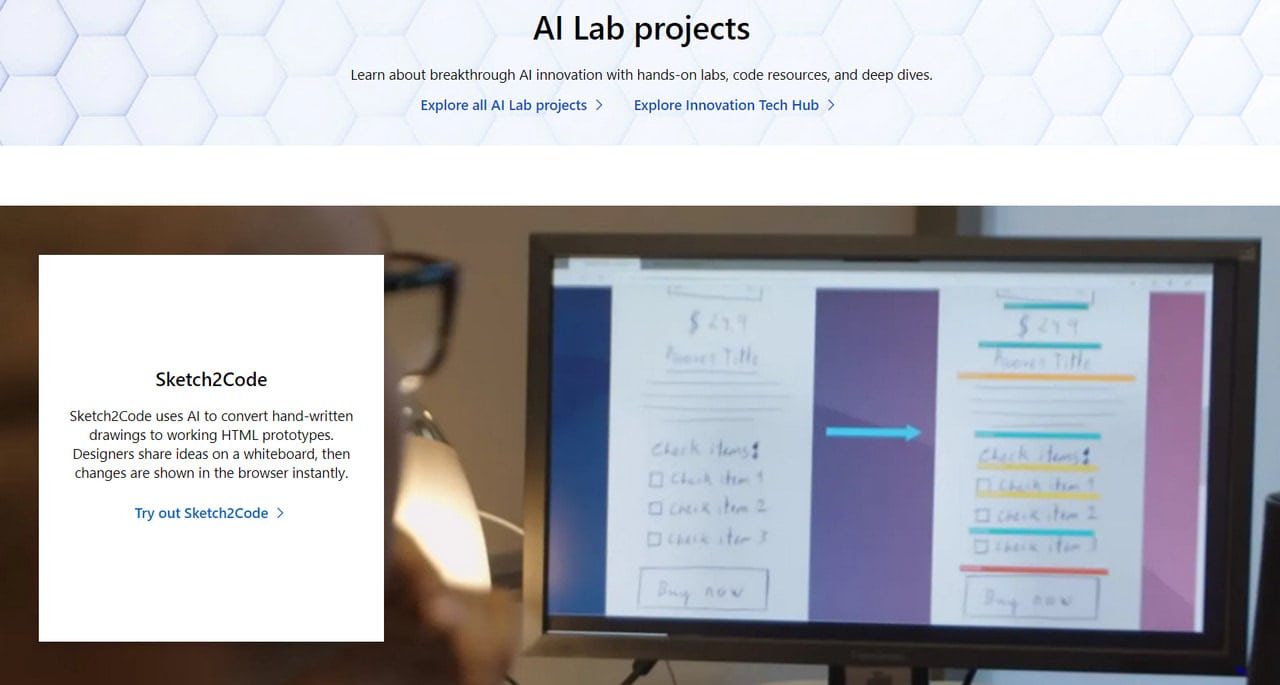
Created by Microsoft, this outstanding AI-powered tool is gaining popularity in the web community quite rapidly. It already has a huge fan base that exploits its potential to simplify workflow processes and push boundaries.
It is said that Sketch to Code has been trained on millions of images. Therefore, you should expect some polished results from it. Indeed, this AI solution performs well when recognizing hand-drawn web design elements like a textbox or button on paper and translating them into digital versions set on digital sheets. You may even transform the web page wireframe into a digital layout within seconds.
That is not all. This digital version will have an HTML version, so web designers can draw a UI wireframe and turn it into a working prototype without any technical skills and experience with programming.
Sensei by Adobe
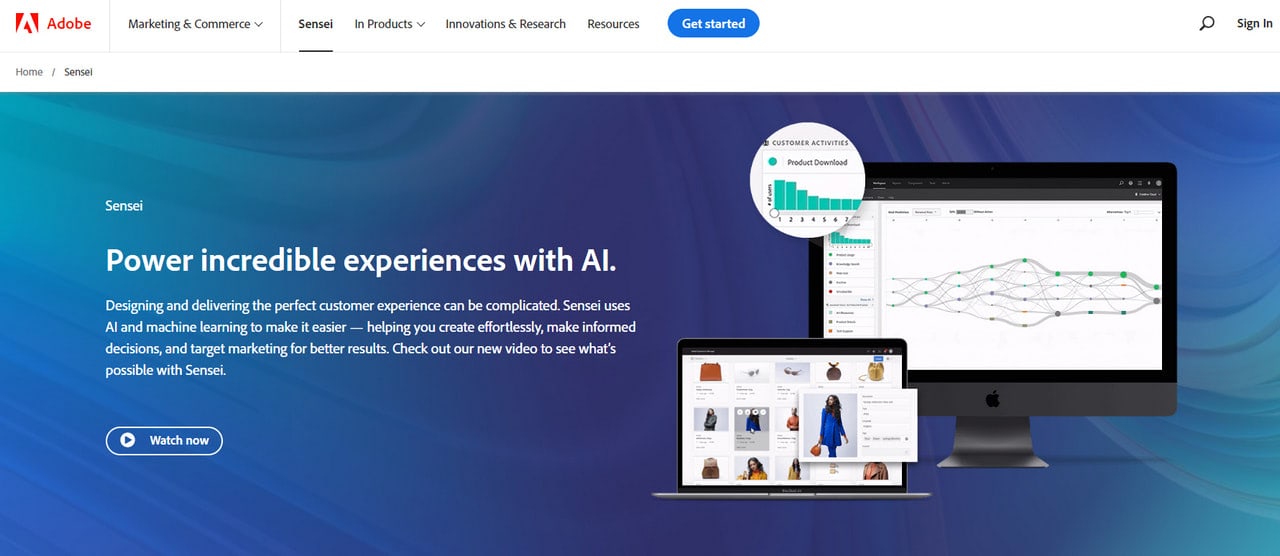
Another big name in our collection of the best AI tools for web designers is all about increasing productivity and making a workflow an enjoyable pastime.
Adobe Sensei is an artificial intelligence tool that integrates with Adobe software. It was created to help marketers, advertisers, and, most importantly, creatives, including web designers, to deliver the perfect customer experience through their means of communication within a short time. It offers a range of capabilities, including:
- Locating the right assets through a powerful, intuitive search in Adobe Stock and Adobe Photoshop Lightroom.
- Minimizing time-consuming tasks with AI-powered features available in Adobe Photoshop and Adobe InDesign.
- Adding spectacular effects and creating photo manipulations through intelligent plugins.
- Editing complicated works quickly and efficiently.
- Handling and automating the time-consuming parts of the job.
- Empowering content creation and personalization.
Powering creative tools in Adobe Suite, AI makes it much easier and faster for web designers to create exactly what they envision.
One more thing
We have featured the best AI tools for web designers. There are more of them, as this niche is only gaining momentum.
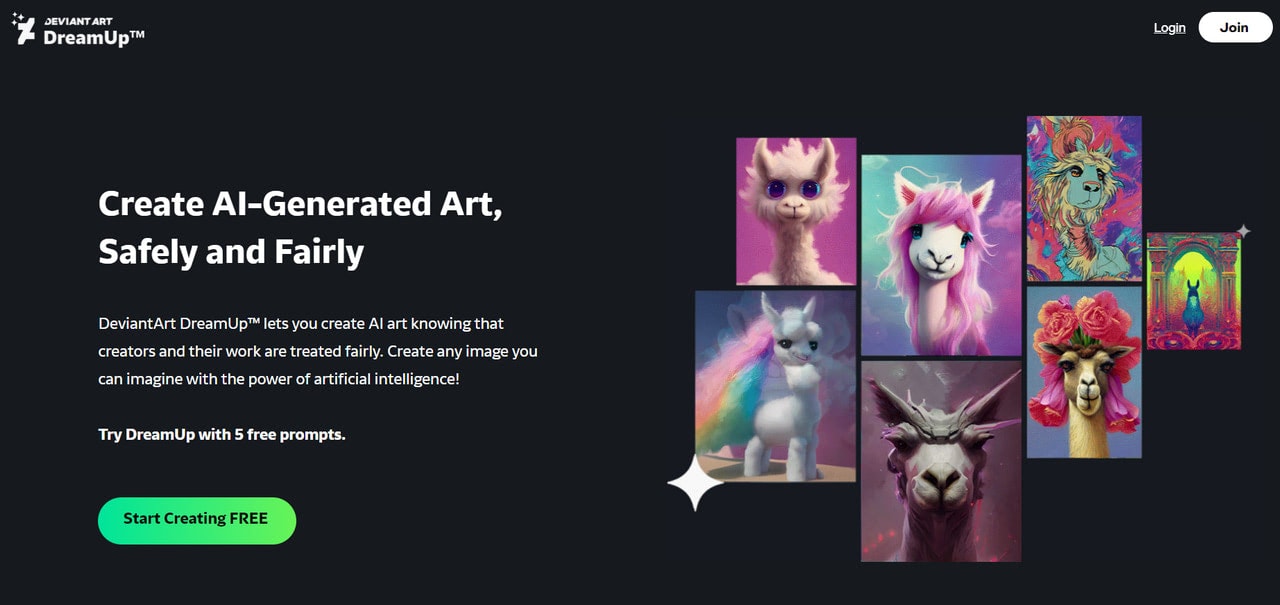
Check out some other great AI-powered instruments as well. Although they are primarily intended for graphic designers, nevertheless, as a web designer, you may find them helpful in numerous situations, such as creating hyper-personalized images for e-commerce projects or hero areas for landing pages:
- Canvas by Nvidia – An excellent instrument for drawing landscapes and pictures in different styles.
- Autodraw – A small yet exceptional AI tool for fast drawing. It is a little bit rough compared to others. Nevertheless, it can still do some exciting tricks and save designers a lot of time.
- Deep Dream Generator – A learning machine that creates fantasy pictures from photos uploaded by designers using AI algorithms.
- Dream Up – An AI-based drawing machine created by DeviantArt. It leverages the user’s prompts to create the pictures.
Conclusion
AI already has multiple tangible use cases enabling corporate revenue growth and cost savings in numerous existing sectors; the web design sphere is no exception. With the rapid advancement of AI technologies, web designers have been presented with unique opportunities to streamline their workflow and do tasks quicker and easier.
While this tendency seems scary at some point due to its fast pace that revolutionizes the old ways, making some people believe that it will put an end to web designers, replacing them entirely. However, as previous experience with automated processes and machine-based development showed, custom-made assets are the most valuable, demanding, and expensive ones. Mass manufacturing does not kill creativity; on the contrary, it presents exciting opportunities to flourish, push boundaries and reach new heights.
By delegating tasks and doing some menial chores quickly and easily, web designers will have time to explore more creative ideas while applying minimum effort. Therefore, follow the trend and use AI-powered technologies to streamline the workflow, avoid boring, tedious, repetitive tasks and complete your project fast and more efficiently to provide yourself with extra time for self-development and growth.
